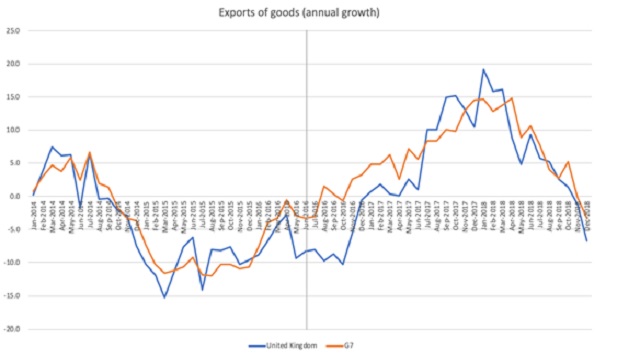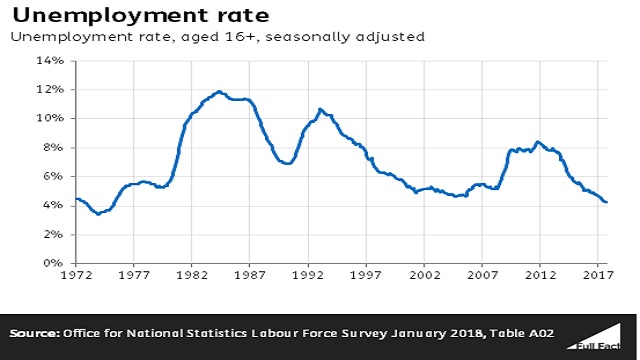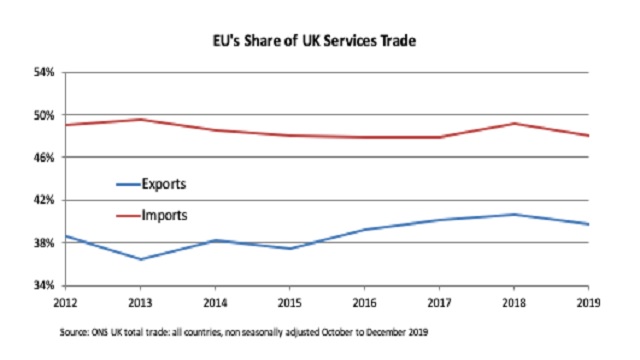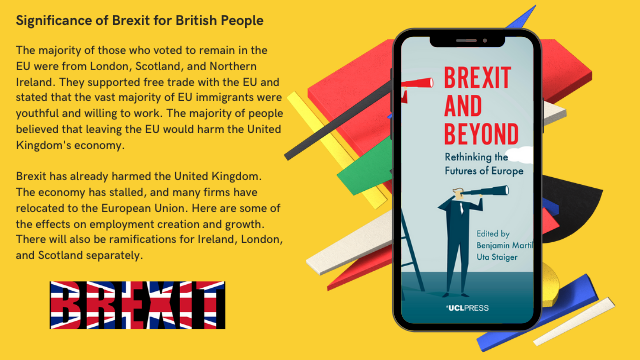Introduction
The United Kingdom’s resigning from the European Union is referred to as “Brexit.” It’s a mix of the words “Britain” and “exit.” The UK and the EU signed a temporary free-trade deal on December 24, 2020, ensuring that the two sides can export products without tariffs or restrictions. But, significant aspects of the new agreement, including trade in services, which accounts for 80% of the UK economy, remain unclear (HAYES, 2021). Considering the Significance of Brexit for British People, Brexit has far financial and political consequences for both the UK and the EU, necessitating scholarly investigation (Bulger & Quaglia, 2018).
The first examines how Brexit would affect essential policy areas such as the single market, finance, and population. Because they are connected to the Single Economy’s “four freedoms,” the policies chosen are those in which the implications of Brexit are most likely to be substantial. The second section delves into significant ‘horizontal’ or structural concerns, such as the knowledge gained from Brexit for theoreticians (Bulger & Quaglia, 2018).
The people who live in the existing EU are the stakeholders of Brexit, as everyone will be affected to some degree by the UK quitting, whether that be a harsh or gentle exit. Impacts on the UK have already been noticed, such as the decrease in the pound’s value versus the euro, and there will be so many to come, some positive, some terrible, as the months pass and people know more about the form of Brexit.
In terms of the global economy, the United Kingdom will continue trading. Brexit does not imply that it will disappear or that purchasing and selling would suddenly cease. The outcome of the US elections will have a considerably more significant impact on it than the outcome of Brexit (Calvert, 2021).
We first discuss the relevance of Brexit for the British people in this brief paper. The impacts of Brexit on the people. Also, the difficulties that the administration has in putting the plan into action.
Significance of Brexit for British People
The Conservative Party first proposed the referendum in 2015. The majority of pro-Brexit supporters in England’s rural were elderly, working-class people. They were concerned about the unrestricted mobility of immigration, arguing that residents from poorer nations were stealing jobs and benefits in the procedure. EU tariffs irritated small firms as well. Some believed that exiting the EU would result in employment creation. Many people believe the United Kingdom contributes more to the EU than it receives (Mueller & Robins, 2021).
The majority of those who voted to remain in the EU were from London, Scotland, and Northern Ireland. They supported free trade with the EU and stated that the vast majority of EU immigrants were youthful and willing to work. The majority of people believed that leaving the EU would harm the United Kingdom’s economy ( Moschieri & J. Blake , 2019) .
Brexit has already harmed the United Kingdom. The economy has stalled, and many firms have relocated to the European Union. Here are some of the effects on employment creation and growth. There will also be ramifications for Ireland, London, and Scotland separately.
- Development
Considering the Significance of Brexit for British People, The most significant consequence of Brexit is the harm it does to the UK’s economic growth. The majority of this is due to the ambiguity around the eventual result. Brexit uncertainty had reduced the United Kingdom’s growth from 2.4 percent in 2015 to 1.0 percent in 2019. According to the UK government, Brexit may reduce the country’s growth by up to 6.7 percent over the next 15 years. It was based on existing free trade agreements but with certain limitations (Mueller & Robins, 2021).

Figure1: Economic Growth after Brexit – Source: (Dunin-Wasowicz, 2019)
The British pound dropped from $1.48 on referendum day to $1.36 the next day. This benefits exporters but raises import prices. It still hasn’t recovered its pre-Brexit peak (Mueller & Robins, 2021).
- Workplaces
Considering the Significance of Brexit for British People, The younger generation in the United Kingdom suffers as a result of Brexit. By 2030, Germany is expected to have a 3 million skilled workforce deficit. After Brexit, those jobs will be harder to come by for British people. As a result, employers are having a difficult time hiring qualified candidates. One explanation is that EU-born employees fled the UK in droves, with their numbers plummeting by 95% in 2017 (Mueller & Robins, 2021).

Figure 2: Unemployment rate after Brexit
- Trading
Considering the Significance of Brexit for British People, The United Kingdom must establish new trade deals with nations outside of the European Union, which currently has more than 40 trade accords in place with 70 countries (Mueller & Robins, 2021).

Figure 3: Trading after Brexit – Source: (Sampson, 2017)
Ireland: The Republic of Ireland, with which it shares a land border, continues to be a member of the European Union. The accord eliminates the need for a trade border between the two Irish nations. The Troubles, a 30-year struggle in Northern Ireland between primarily Catholic Irish nationalists and pro-British Protestants, may have been revived by a trade barrier. It came to a conclusion in 1998 with the assurance of no Northern Ireland-Ireland border. About 9,300 workers would have been compelled to travel by immigration on their route to and from work and school if there had been a regulatory barrier (AMADEO, 2021).
London: Brexit has already slowed growth in London, the United Kingdom’s financial capital, which recorded only 1.4 percent growth in 2018 and was close to zero in 2019. Between 2016 and 2019, company investment fell by 11% as a result of Brexit. International businesses are less inclined to choose London as an English-speaking entry point into the EU market. Goldman Sachs, JP Morgan, and Morgan Stanley relocated 10% of their customers to their Irish subsidiaries, while Barclay’s shifted 5,000 customers to its Irish unit. In addition, 100 bankers have been relocated to Bank of America’s Dublin branch and 400 to a brokerage firm group in Paris (AMADEO, 2021).
Scotland: Scotland voted no to leave the EU. According to the Scottish government, staying in the EU was the most excellent option for Scotland and the United Kingdom. It has been pressuring the British government to enable a second referendum to be held. Scotland would have to keep an independence referendum to leave the United Kingdom. It would be able to apply for EU membership on its own after that (AMADEO, 2021).
Advantage and Disadvantages of Brexit
Considering the Significance of Brexit for British People, The economic breakdown is an uncommon occurrence. There is little precedent for evaluating a country’s exit from a regional financial organisation like the European Union (EU), as the United Kingdom (UK) is preparing to do. While traditional approaches for examining integrating paths can give some information when used in reverse, a country’s separation from a kind of integration. Disassociating a government of a type of unity as extensive as the EU entails far more than canceling a favorable trade deal. As a result, the United Kingdom’s (UK) withdrawal from the Union offers economists and their research techniques a challenge (Begg, 2017).
Advantages:
- If the United Kingdom decides on a Brexit Deal, it will have more autonomy in negotiating trade agreements and laws.
- A Brexit Deal is when the United Kingdom abandons its membership in the European Union’s market and customs union.
- Including those who chose to remain in the EU, consider restoring autonomy a victory.
- As a member of the EU, Britain might have more power over international issues as part of a society of 500 million people considering the Significance of Brexit for British People.
- Britain has shown that it can opt-out of various EU policies that it finds inconvenient, such as the Eurozone’s acceptance, the Schengen Agreement, and mandatory migration restrictions (Begg, 2017).
- A united Britain is best prepared to confront security concerns like terrorists and cross-border criminality.
- Annually, European companies spend billions of pounds in the UK, both in the public and commercial sectors.
- Belonging in the EU grants Britain entrance to the European single market, which is crucial for commerce and allows for the free movement of goods, resources, and people between member states.
- Free trade inside the EU lowers obstacles and allows businesses to expand considering the Significance of Brexit for British People.
- Lots of British employment are dependent on Europe and may be threatened. Some industries, such as healthcare and industry, may see a shortage of trained workers.
- The average British citizen saves hundreds of pounds each year due to the EU’s cheaper costs on products and services (Begg, 2017).
Disadvantages:
- The United Kingdom benefited from trade agreements between the EU and other major powers since it is an EU member.
- The EU as a whole has more negotiating leverage since it is the world’s largest economy. So, if the UK quits the EU, it will lose negotiation leverage and unrestricted trade with other European nations (Begg, 2017).
- As the United Kingdom attempts to re-establish trade agreements with other nations, they may become less beneficial.
- The UK’s economic strength would be limited if it remained in the EU, and an independent seat at the World Trade Organisation would be impossible (WTO).
- Without the Possibility of having paradoxical European ideas pushed on it, Britain will have more control over its rules and regulations(Begg, 2017).
- Some Brexit supporters feel that complete border restrictions would improve Britain’s internal security, which they think would be beneficial.
- The thousands in EU membership fees might be reused and invested on essential matters to the British people, like Healthcare financing.
- Because of its EU membership, Britain cannot fully benefit from trade with other big economies such as Japan, India, and the United States.
- The EU imposes sluggish and rigid government red tape on Britain, making it more difficult for small businesses to expand.
- Enhanced national trade deals and more targeted immigration might boost the employment market in the United Kingdom.
- Annually, EU VAT payments and agricultural subsidy programs cost British citizens hundreds of pounds (Begg, 2017).
Key Challenges the Government Might Face to Implement of Brexit
Economic and governance problems posed by Brexit in different sections of the UK. These challenges are consider in the factors of the UK government’s recent “power leveling” policy. The aim is to present a full picture of rising subnational and client state concerns theoretically and practically (Billing, McCann, Argiles, Sevinc, 2020).
The process of exiting the EU has been compared to post-war rebuilding and the development of the benefits system. Whether seen from the lens of the legal, technological, and regulatory issues that must be resolved. According to a recent analysis by a scholarly research group thinks that The UK in a Developing Europe, the government has various problems after Brexit, like negotiating a new trade deal with the EU, creating and implementing a slew of new policies, reforming the economy, and keeping the Union united.
- Including its unique trade strategy is designing and implementing its immigration, agriculture, and environmental regulations. All of these will need trade-offs among opposing interests, as well as complex managerial issues.
- Specifically, developing a cohesive and comprehensive approach to transforming the British economy after Brexit. To reduce the negative consequences of a more remote commercial relationship with the EU and keep its pledges to level the playing field.
- Creating new organisations to take over the EU’s tasks, such as the planned new Office for Environmental Protection. And the independent committee tasked with overseeing the execution of the people’s freedoms accord.
- Keep the Nation together during forces straining the present system: Westminster pressing forward laws over regional councils’ views, and Scotland and Northern Ireland rebelling at the government’s Brexit agreement’s economic ramifications.
The trade agreement itself will be pretty tricky. According to the writers, the administration’s reluctance to consider an expansion will make it challenging to settle on anything more than “the tiniest of bare-bones arrangements.” In addition, the government’s choice to make the freedom to deviate from EU regulations a priority in the future will restrict what may be negotiated upon. Whichever safety agreement is reached, the EU’s criminal justice system and legal coordination capabilities will have less access than they do now ( Moschieri & J. Blake, 2019). The European Assault Charge, the Schengen Communications Network, and the European Criminal Record Communications Network will not be accessible to non-member states outside of Schengen. Other land mines on the program include fisheries, data security, proprietary information, aviation, and transportation accessibility, as well as the general issue of how the deal will be governed, implemented, and conflicts addressed. The European Union is anticipated to push for the European Court of Justice to have a role, but the government is opposed (Wright, 2017).
Governments have failed to be open and honest with the people about their decisions, especially in terms of economic consequence, increased red tape, and state expansion. “Having got Brexit done, in the perspective of leaving the Eu, was, in a sense, the easier part,” said Professor Anand Menon, director of The UK in a Changing Europe. However, the government now faces a new challenge. The administration now faces the task of completing a series of difficult discussions in less than a year and implementing programs and procedures to substitute those of the EU. It must also confront the political imperatives produced by Brexit and its fallout, which is possibly the most crucial and difficult task of all. These are significant and challenging difficulties ( Moschieri & J. Blake, 2019).
Authorities and commentators have both emphasized the difficulty that Brexit will provide. For example, Lord Kerslake, who led the public sector from 2012 to 2014, has voiced worry that there are generally not enough civil employees to execute it while still advancing other policies. Thus, there will be a significant challenge regarding numbers to meet these fundamental objectives. This viewpoint is shared by retired Cabinet Secretary Lord O’Donnell, as well as the General and Business Services Union, which asserts the public sector is “severely underfunded and underqualified,” and Possibility, which cites a “scarcity of funds and knowledge in Whitehall and beyond” as a significant concern among its members (Sampson, 2017).
The Centre for Government and the UK in a Developing Europe previously outlined four significant problems that Brexit would provide to the UK civil service: research and planning, cooperation, legal capability, and supply and implementation. These will be influenced by how the government handles the complexity problem, especially when numerous departments and agencies are involved. It can ensure that good funds are accessible and distributed correctly and prioritize goals and objectives to guarantee that results are feasible. The task now assures that this trend continues once official discussions begin (Billing, McCann, Argiles, Sevinc, 2020).
Recommendation
Considering the Significance of Brexit for British People, the government must continue to use the cross-government Boundary Planning Group to coordinate day preparations. Still, there must be defined leadership and accountability for carrying out the entire ready strategy. Further than the Joint Customs Consultative Committee, HMRC, Border Agency, the Ministry for Environment, Agriculture and Rural Development, the Department for Exiting the European Union, and other relevant government organisations and organisations must interact with the business sector. They must utilize more thorough committees to monitor implementation, the reliance on the private industry, and extensive changeover preparation for merchants with 180,000 traders expected to file customs clearance for the first time following leave, as previously stated (Billing, McCann, Argiles, Sevinc, 2020). HMRC should prioritize Customs Declaration Services (CDS) provision in its current form, guaranteeing that the fundamentals are met before introducing new components. Governments must acknowledge that “creative, new ICT” is not a feasible option in the immediate future and must instead focus on updating current systems to deal with Brexit (Bulger & Quaglia, 2018). During the discussions and anything transfer, the Department for Exiting the European Union should prioritize continuous access to EU customs facilities, particularly the EU’s New Computerized Transportation System. HMRC and the Border Force must recognize the border control limits and develop ways to mitigate them, such as Authorized Economic Companies or shifting inspections inside ( Moschieri & J. Blake , 2019).
Conclusion
Finally, the civil employees tasked with putting Brexit into effect will do so in a politically divisive climate where their every action will be examined. Even if the obstacles of complexity, capacity, and practicality are challenging and valid, they may not be enough to justify an apparent lack of leadership. As the two-year deadlock drags on, trust loss might become a significant issue. In the following weeks and months, Brexit will consume a considerable political and bureaucratic capacity (Mueller & Robins, 2021). It will be the most significant, most difficult task confronting the civil service in our peacetime history. There are numerous choices available to the UK once it exited the EU in 2019, but because of the time constraints of the talks, the research has focused on patterns that currently exist. It’s tough to predict which way the words will go, but the political landscape is constantly shifting, and other concerns, especially immigration reform, are gaining center stage.
The word of Brexit is active on a global scale. It is rooted in pre-existing narratives about Britain, Europe, the nation-state, and the international system, and it aids in the construction of specific pasts. On the other hand, Brexit triggers a slew of other often opposed performing speech actions, promising either the established order or a new, wealthy future, not just for the UK, but for the rest of the world (Billing, McCann, Argiles, Sevinc, 2020). Both major parties have rejected freedom of movement in their policy documents, implying that continuing in the EU’s Single Market or the EEA’s Internal Market may be difficult. In the background, the UK may be granted certain exemptions due to its size and economic importance, particularly it’s standing as a top global financial center and key Euro-based settlement site, but this is not a guarantee. Trade treaties take so long because all nations in the Union’s opinions must be taken into account, which is why they take so long, and the era of trade agreements is finished. Rules and higher company taxes are seen as suffocating entrepreneurship by the EU’s authoritarian regulatory stance ( Moschieri & J. Blake , 2019).
References
Moschieri & J. Blake , 2019. The organisational implications of Brexit. Journal of organisation design, pp. https://jorgdesign.springeropen.com/articles/10.1186/s41469-019-0047-8.
AMADEO, K., 2021. What Was Brexit?. What Was Brexit, and How Did It Impact the UK, EU, and the US?, pp. https://www.thebalance.com/brexit-consequences-4062999.
Begg, I., 2017. Brexit. Making Sense of the Costs and Benefits of Brexit: Challenges for Economists, pp. https://link.springer.com/article/10.1007/s11293-017-9550-x.
Billing, McCann, Argiles, Sevinc, 2020. Government challenges. UK analysts’ and policy-makers’ perspectives on Brexit: challenges, priorities and opportunities for subnational areas, p. https://www.tandfonline.com/doi/full/10.1080/00343404.2020.1826039.
Bulger & Quaglia, 2018. The politics and economics of Brexit. Journal of European Public policy, 25(8), p. https://www.tandfonline.com/doi/full/10.1080/13501763.2018.1467957.
Calvert, P. M., 2021. Who are the Stakeholders of Brexit and its effects on the UK and the global economy?. Quora, pp. https://www.quora.com/Who-are-the-Stakeholders-of-Brexit-and-its-effects-on-the-UK-and-the-global-economy.
HAYES, A., 2021. What Is Brexit?. Brexit, p. https://www.investopedia.com/terms/b/brexit.asp.
Mueller & Robins, 2021. What Is Brexit? And How Is It Going?. The New York Times, pp. https://www.nytimes.com/article/brexit-uk-eu-explained.html.
Sampson, T., 2017. Brexit: The Economics of International Disintegration. Brexit, p. https://www.aeaweb.org/articles?id=10.1257/jep.31.4.163.
Wright, N., 2017. Challenges. Delivering Brexit: the four big challenges facing the already strained civil service, pp. https://blogs.lse.ac.uk/politicsandpolicy/delivering-brexit-challenges/.
Written by
Email: [email protected]

